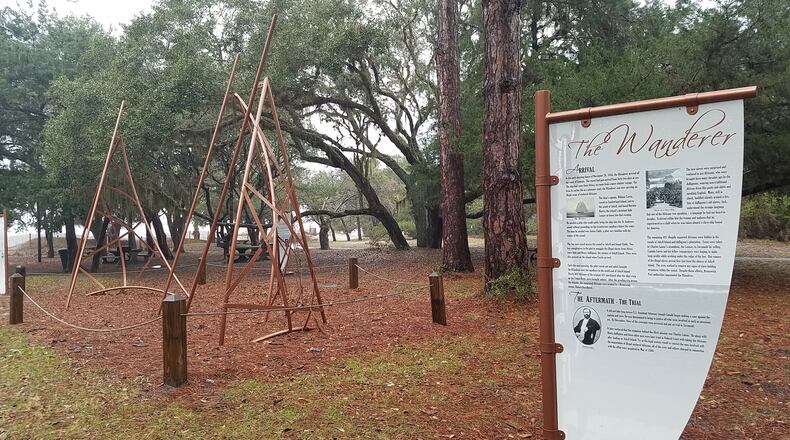History is full of things some would rather not talk about.
Like slavery.
If history is full of terrible things, it's practically overflowing with terrible people.
One such person was Charles Augustus Lafayette Lamar, from Savannah.
In the late 1850s, Lamar joined forces with another awful human being, Charleston ship captain William C. Corrie, to import slaves from Africa, according to historical documents.
Federal law had prohibited importing slaves since 1808, but laws do little to deter those of a piratical nature.
Lamar and Corrie, like pirates, had a ship. A really nice ship.
The Wanderer, a 100-plus foot luxury racing yacht was purchased by Corrie, with assistance from Lamar, in 1858, just a year after it had been built in New York. Newspapers at the time said the ship was so fast it might challenge America, the first winner of the America's Cup sailing trophy.
Lamar, inspired by the "fire-eaters," a group of pro-slavery extremists in the South, sought to reopen the international slave trade. He owned a cotton plantation and was a director of both a railroad company and a bank.
His uncle had been a president of Texas when it was a country. His cousin was a U.S. Senator and later a Supreme Court Justice. His aunt was the wife of a U.S. Treasury Secretary. His father was one of the wealthiest people in Savannah and had an office on Wall Street in New York City.
When Lamar was baptized, the Marquis de Lafayette, the Revolutionary War friend of U.S. presidents George Washington and Thomas Jefferson, did the honors.
Georgia newspapers at the time said Lamar, with his talents and connections, could have been anything, including governor. Unfortunately, with all his gifts, Lamar chose to finance America's last documented slave ship.
Corrie converted the interior of the posh schooner to hold the maximum number of chained humans. Then, in October of 1858, he sailed 30 miles up the Congo River in west Africa and took on 490 people as cargo.
During the six-week voyage back to Georgia, almost 100 people died. On November 28, 1858, The Wanderer dumped 409 slaves ashore on Georgia's Jekyll Island. Lamar shipped his cargo to legal domestic slave markets in Savannah, Augusta, South Carolina and Florida.
Word soon spread of the Wanderer slaves. Southern politicians used the incident to demand an end to the ban of the Atlantic slave trade. Northern states demanded the federal government never allow another Wanderer.
Lamar and his business partners stood trial in federal court several times. But no jury would convict them.
Soon, the question of slavery was settled by the Civil War. The Wanderer was seized by Union forces and used to seize Confederate ships and cargo.
Lamar fought for the Confederacy and was noted for his ability to slip cargo past Union blockades.
He died fighting for the horrible things he believed in. Days after the Civil War officially ended he was killed in Columbus after refusing to surrender. U.S. General William Tecumseh Sherman said Lamar was the last Confederate soldier killed in the Civil War.
The only physical reminder of this sad story is a small monument tucked off a road on the sleepiest corner of Jekyll Island.
The Wanderer Monument evokes the lines of sailing ships emanating from the Georgia soil.
It is subtle, graceful. Like memory, it has the power to touch those who reflect upon it.
About the Author
Keep Reading
The Latest
Featured


